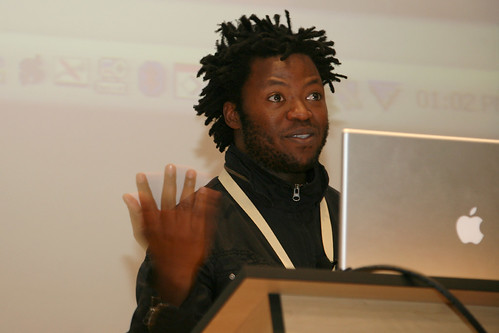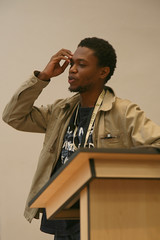By Melissa Gardiner
Anti-apartheid activist Steve Biko published a collection of writings called I Write What I Like, speaking out against censorship under apartheid. With the rise of the internet, we have found ourselves in the throes of the “democratic” digital age and blogging gives people the opportunity to say what they like, in the medium they like — be it video, podcasts or photographs.

Vlogger Khaya Dlanga, who spoke at the Digital Citizen Indaba in Grahamstown on Sunday, has made a name for himself on international video site YouTube as Khaya V. His controversial vlogs comment on issues from black African identity to political satire. The visual “anything goes” medium has allowed Dlanga to challenge the status quo and, because of this, he has become one of the most popular names on YouTube. He said that he does sometimes censor himself because of people’s heated comments on issues of religion, and race. “I’m a coward,” he said, smiling

Philemon Msangi, aka Bob Sankofa, says what he likes through photographs. In Africa, the language barrier is a big issue facing bloggers. In his presentation titled Why I Blog (And the Things That Happen Because I Do), Msangi said that because of the global nature of the internet and blogging, most of his blog readers do not come from his native Tanzania and do not share his mother tongue, kiSwahili. This makes it difficult to write what he likes so he “talks to [his readers] through photos”. He expresses his thoughts and feelings by posting photos. He said blogging in this way gives him the freedom to express himself.
However, he added that while blogs are good because they give people freedom of expression, sometimes there is too much freedom and bloggers can’t handle it. “Some blogs are destructive,” he said, because there is no one to edit blog entries. For Msangi, the key to a good blog is a clear goal. “You have to ask why you want to start a blog,” he said, adding that bloggers should not abuse their freedom. In South Africa, this freedom was abused in the case of infamous South African “male sex worker” blogger Skye, who listed local celebrities alleged to be his past clients. This led to calls for the censorship of blogs and the web in general.
Blogging, as a democratic medium, has provided Africans with a space to “write what they like” and be heard. Whereas traditional media reach a limited number of people in a specific geographical area, blogs give people much more freedom.
Gardiner is a student in the New Media Lab at Rhodes University.


